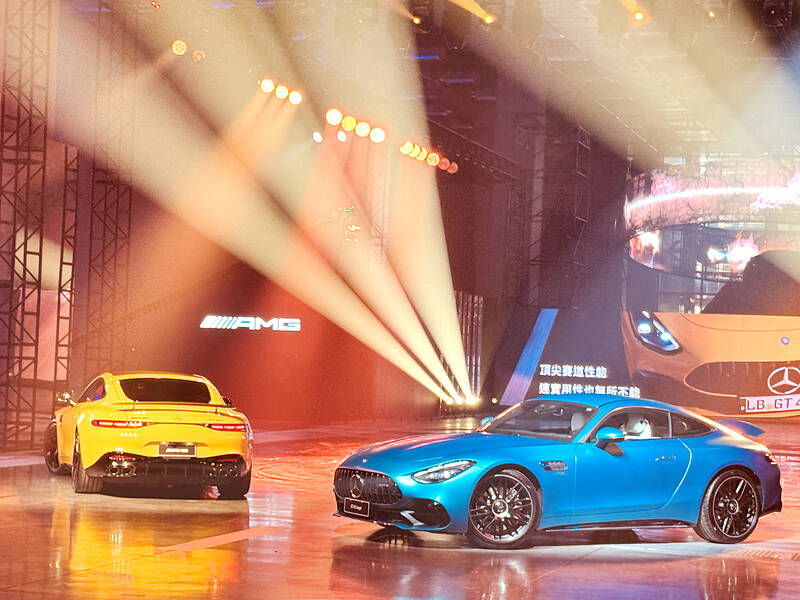New car sales in Taiwan last year fell 4 percent to the third-highest level on record as auto market consumption returned to normal following a sales boom in 2023, online market researcher U-Car.com said in a report yesterday, citing the latest government data.
The number of applications for vehicle license plates, an indicator of new car sales, slowed to 457,830 units last year, from 476,987 units a year earlier, the second-highest level since 2005, when 514,626 units were requested, the data compiled by the Ministry of Transportation and Communications showed.
The full-year results came as new car sales last month fell 4.3 percent year-on-year to 41,302 units. However, the figure rose 5.4 percent month-on-month, boosted by year-end promotion campaigns by automakers and dealers coupled with new arrivals of imported models, the data showed.

Photo: Amy Yang, Taipei Times
Sales of imported cars last year reached 220,503 units, an annual decrease of 1.8 percent, and a market share of 48.2 percent. The number of luxury imported cars increased 2.9 percent to 115,445 units, a market share of 25.2 percent, the data found.
Market leader Hotai Motor Co (和泰汽車), which distributes Toyota and Lexus vehicles in Taiwan, sold 12,637 units last month, bringing the company’s total sales for last year to 153,526 units, down 3.6 percent from the year before.
That still allowed Hotai to remain the No. 1 vendor in Taiwan for 23 consecutive years with a market share of 33.5 percent, the largest in 11 years, the company said.
In contrast, Yulon Nissan Motor Co (裕隆日產), which distributes Nissan and Infiniti vehicles, Honda Taiwan Co (台灣本田) and China Motor Corp (中華汽車), which makes its namesake brand as well as Mitsubishi and MG-branded vehicles, reported annual declines of 16.7 percent, 11.9 percent and 0.2 percent in sales to 19,842, 26,791 and 51,224 units in the year respectively, the data showed.
However, annual sales at Sanyang Industrial Co (三陽工業), which distributes Hyundai vehicles, rose 2.3 percent to 22,691 units, and Mazda Motor Taiwan’s (台灣馬自達) new car sales increased 7.1 percent to 14,776 units last year, the data showed.
Some popular imported brands, including Mercedes-Benz, BMW and Tesla, also fared better than expected with sales last year rising 7.6 percent, 14.7 percent and 16.1 percent year-on-year to 26,296, 20,332 and 15,276 units, respectively. However, Volvo sales declined 2.4 percent to 9,908 units and Audi delivered 3,945 cars, down 20.1 percent, the data showed.
For this month, total vehicle sales in Taiwan are forecast to reach 42,000 units, down 6.3 percent year-on-year due to fewer working days, despite promotions by automakers and dealers ahead of the Lunar New Year holiday, Hotai said.
Lunar New Year — the most important traditional holiday in Taiwan and also known as the Spring Festival — falls on Jan. 29 this year.

Taiwan Semiconductor Manufacturing Co (TSMC, 台積電) yesterday said that its investment plan in Arizona is going according to schedule, following a local media report claiming that the company is planning to break ground on its third wafer fab in the US in June. In a statement, TSMC said it does not comment on market speculation, but that its investments in Arizona are proceeding well. TSMC is investing more than US$65 billion in Arizona to build three advanced wafer fabs. The first one has started production using the 4-nanometer (nm) process, while the second one would start mass production using the

When an apartment comes up for rent in Germany’s big cities, hundreds of prospective tenants often queue down the street to view it, but the acute shortage of affordable housing is getting scant attention ahead of today’s snap general election. “Housing is one of the main problems for people, but nobody talks about it, nobody takes it seriously,” said Andreas Ibel, president of Build Europe, an association representing housing developers. Migration and the sluggish economy top the list of voters’ concerns, but analysts say housing policy fails to break through as returns on investment take time to register, making the

‘SILVER LINING’: Although the news caused TSMC to fall on the local market, an analyst said that as tariffs are not set to go into effect until April, there is still time for negotiations US President Donald Trump on Tuesday said that he would likely impose tariffs on semiconductor, automobile and pharmaceutical imports of about 25 percent, with an announcement coming as soon as April 2 in a move that would represent a dramatic widening of the US leader’s trade war. “I probably will tell you that on April 2, but it’ll be in the neighborhood of 25 percent,” Trump told reporters at his Mar-a-Lago club when asked about his plan for auto tariffs. Asked about similar levies on pharmaceutical drugs and semiconductors, the president said that “it’ll be 25 percent and higher, and it’ll

CHIP BOOM: Revenue for the semiconductor industry is set to reach US$1 trillion by 2032, opening up opportunities for the chip pacakging and testing company, it said ASE Technology Holding Co (日月光投控), the world’s largest provider of outsourced semiconductor assembly and test (OSAT) services, yesterday launched a new advanced manufacturing facility in Penang, Malaysia, aiming to meet growing demand for emerging technologies such as generative artificial intelligence (AI) applications. The US$300 million facility is a critical step in expanding ASE’s global footprint, offering an alternative for customers from the US, Europe, Japan, South Korea and China to assemble and test chips outside of Taiwan amid efforts to diversify supply chains. The plant, the company’s fifth in Malaysia, is part of a strategic expansion plan that would more than triple